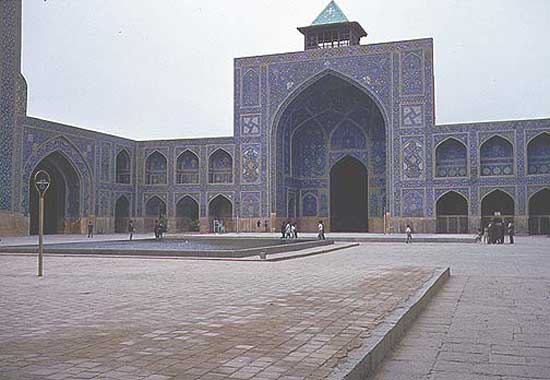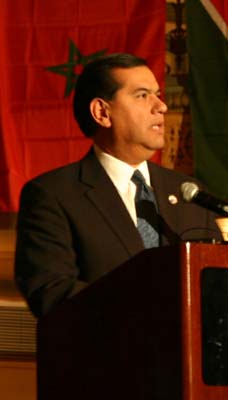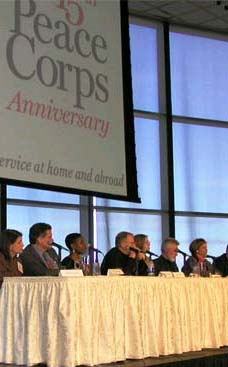
"The choice is either to be stampeded into a reckless adventure profoundly damaging to long-term U.S. national interests or to become serious about giving negotiations with Iran a genuine chance to be productive. The mullahs were on the skids several years ago but were given a new burst of life by the intensifying confrontation with the United States. The U.S. strategic goal, pursued by real negotiations and not by posturing, should be to separate Iranian nationalism from religious fundamentalism. Treating Iran with respect and within a historical perspective would help to advance that objective. American policy should not be swayed by a contrived atmosphere of urgency ominously reminiscent of what preceded the intervention in Iraq. "
Zbigniew Brzezinski writes: Do not attack Iran
Do not attack Iran
Zbigniew Brzezinski TMSI
WEDNESDAY, APRIL 26, 2006
WASHINGTON Iran's announcement that it has enriched a minute amount of uranium has unleashed urgent calls for a preventive U.S. air strike by the same sources that earlier urged war on Iraq.
If there is another terrorist attack in the United States, you can bet your bottom dollar that there will be also immediate charges that Iran was responsible in order to generate public hysteria in favor of military action.
But there are four compelling reasons against a preventive air attack on Iranian nuclear facilities:
1. In the absence of an imminent threat (with the Iranians at least several years away from having a nuclear arsenal), the attack would be a unilateral act of war.
If undertaken without formal Congressional declaration, it would be unconstitutional and merit the impeachment of the president. Similarly, if undertaken without the sanction of the UN Security Council either alone by the United States or in complicity with Israel, it would stamp the perpetrator(s) as an international outlaw(s).
2. Likely Iranian reactions would significantly compound ongoing U.S. difficulties in Iraq and in Afghanistan, perhaps precipitate new violence by Hezbollah in Lebanon, and in all probability cause the United States to become bogged down in regional violence for a decade or more to come. Iran is a country of some 70 million people and a conflict with it would make the misadventure in Iraq look trivial.
3. Oil prices would climb steeply, especially if the Iranians cut their production and seek to disrupt the flow of oil from the nearby Saudi oil fields. The world economy would be severely impacted, with America blamed for it. Note that oil prices have already shot above $70 per barrel, in part because of fears of a U.S./Iran clash.
4. America would become an even more likely target of terrorism, with much of the world concluding that America's support for Israel is itself a major cause of the rise in terrorism. America would become more isolated and thus more vulnerable while prospects for an eventual regional accommodation between Israel and its neighbors would be ever more remote.
It follows that an attack on Iran would be an act of political folly, setting in motion a progressive upheaval in world affairs. With America increasingly the object of widespread hostility, the era of American preponderance could come to a premature end.
While America is clearly preponderant in the world, it does not have the power - nor the domestic inclination - to both impose and then to sustain its will in the face of protracted and costly resistance. That certainly is the lesson taught both by its Vietnamese and Iraqi experiences.
Moreover, persistent hints by official spokesmen that "the military option is on the table" impedes the kind of negotiations that could make that option redundant. Such threats unite Iranian nationalism with Shiite fundamentalism. They also reinforce growing international suspicions that the United States is even deliberately encouraging greater Iranian intransigence.
Sadly, one has to wonder whether in fact such suspicions may not be partially justified. How else to explain the current U.S. "negotiating" stance: the United States is refusing to participate in the on-going negotiations with Iran but insists on dealing only through proxies. That stands in sharp contrast with the simultaneous negotiations with North Korea, in which the United States is actively engaged.
At the same time, the United States is allocating funds for the destabilization of the Iranian regime and is reportedly injecting Special Forces teams into Iran to stir up non-Iranian ethnic minorities in order to fragment the Iranian state (in the name of democratization!). And there are people in the Bush administration who do not wish any negotiated solution, abetted by outside drum-beaters for military action and egged on by full-page ads hyping the Iranian threat.
There is unintended but potentially tragic irony in a situation in which the obscene language of President Mahmoud Ahmadinejad (whose powers are actually much more limited than his title implies) helps to justify threats by administration figures who like to hint of mushroom clouds, which in turn help Ahmadinejad to exploit his intransigence to gain more fervent domestic support for himself as well as for the Iranian nuclear program.
It is therefore time for the administration to sober up, to think strategically, with a historic perspective and with America's national interest primarily in mind. Deterrence has worked in U.S.-Soviet relations, in U.S.-Chinese relations, and in Indo-Pakistani relations.
The notion that Iran would someday just hand over the bomb to some terrorist conveniently ignores the fact that doing so would tantamount to suicide for all of Iran since Iran would be a prime suspect and nuclear forensics would make it difficult to disguise the point of origin.
It is true, however, that an eventual Iranian acquisition of nuclear weapons would heighten tensions in the region. Israel, despite its large nuclear arsenal, would feel less secure. Preventing Iranian acquisition of nuclear weapons is, therefore, justified, but in seeking that goal the United States must bear in mind longer-run prospects for Iran's political and social development.
Iran has the objective preconditions in terms of education, place of women in social affairs and in social aspirations (especially of the youth) to emulate in the foreseeable future the evolution of Turkey. The mullahs are Iran's past, not its future; it is not in our interest to engage in acts that help to reverse that sequence.
Serious negotiations require not only a patient engagement but also a constructive atmosphere. Artificial deadlines, propounded most often by those who do not wish the United States to negotiate in earnest, are counterproductive. Name-calling and saber-rattling, as well as refusal to even consider the other side's security concerns, can be useful tactics only if the goal is actually to derail the negotiating process.
Several conclusions relevant to current U.S. policy stem from the foregoing:
The United States should become a direct participant in the negotiations, joining the three European negotiating states, as well as perhaps Russia and China (both veto-casting UN Security Council members), in direct negotiations with Iran, on the model of the concurrent multilateral talks with North Korea;
As in the case of North Korea, the United States should also simultaneously engage in bilateral talks with Iran regarding mutually contentious security and financial issues;
The United States should be a signatory party to any quid-pro-quo arrangements in the event of a satisfactory resolution of the Iranian nuclear program and of regional security issues.
At some point in the future, the above could perhaps lead to a regional agreement for a nuclear weapons-free zone in the Middle East, especially after the conclusion of an Israeli- Palestinian peace agreement, endorsed also by all the Arab states of the region. At this stage, however, it would be premature to inject that complicated issue into the negotiating process with Iran.
The choice is either to be stampeded into a reckless adventure profoundly damaging to long-term U.S. national interests or to become serious about giving negotiations with Iran a genuine chance to be productive. The mullahs were on the skids several years ago but were given a new burst of life by the intensifying confrontation with the United States.
The U.S. strategic goal, pursued by real negotiations and not by posturing, should be to separate Iranian nationalism from religious fundamentalism. Treating Iran with respect and within a historical perspective would help to advance that objective.
American policy should not be swayed by a contrived atmosphere of urgency ominously reminiscent of what preceded the intervention in Iraq.
Zbigniew Brzezinski was national security adviser to President Jimmy Carter. This Global Viewpoint article was distributed by Tribune Media Services International.


















